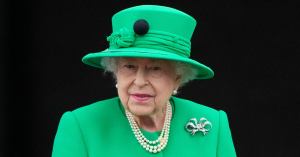The death toll of the COVID-19 pandemic surpassed 300,000 lives in the U.S. on Monday, according to data from Johns Hopkins University. The university’s data is frequently cited by journalists, though some other counts range higher and lower. The grim milestone comes just as the nation begins getting its first round of coronavirus vaccines.
By Johns Hopkins’ count, the U.S. has reported about 16.4 million cases of COVID-19, and 300,361 deaths from the disease at the time of this writing. An estimated 3,300 deaths on Friday and 2,300 deaths on Saturday pushed the country over the 300,000 mark, to the dismay of public health officials everywhere. By any analysis, these numbers are nightmarish — even accounting for the U.S.’s population and comparing its testing capacity to that of other countries.
Videos by PopCulture.com
Still, the development of effective COVID-19 vaccines is providing a light at the end of the tunnel for many Americans. On Friday, the U.S. Food and Drug Administration approved the Pfizer-BioNTech vaccine for emergency use, and on Monday, the first patients in the country got the treatment. According to a CBS News report, healthcare workers and nursing home patients will be the first to receive the vaccine.
Meanwhile, the FDA may approve another vaccine from Moderna Inc as soon as Friday, according to a report by CNBC. If so, there will be more than twice as many doses of that vaccine ready to ship than there were of the Pfizer vaccine — about six million to start rather than 2.9 million.
The vaccine roll out will be slow and will face several challenges, so public health officials are urging Americans to continue observing safety precautions for the next few months. The CDC warned that coronavirus deaths could reach as high as 362,000 by Jan. 2 in the U.S., and this weekend, former FDA Commissioner Scott Gottlieb told CBS News that infections will likely peak in January, due to Americans travelling during the holidays.
“The pressure is going to be on the health care system, and we need to keep the health care system from getting maxed out,” Gottlieb said. “They’re not going to see peak-burden on hospital resources probably until mid-January, late January.”
State and local governments are implementing strict new shut-down orders in some places right now, and public health officials say more may be on the way. New York City shut down indoor dining last week, and Mayor Bill De Blasio said an even more strict stay-at-home order could be on the way. For the latest public health recommendations, visit the websites of the CDC and the World Health Organization.





